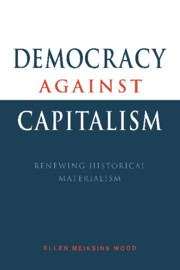Book contents
- Frontmatter
- Contents
- Acknowledgements
- Introduction
- I HISTORICAL MATERIALISM AND THE SPECIFICITY OF CAPITALISM
- II DEMOCRACY AGAINST CAPITALISM
- 6 Labour and democracy, ancient and modern
- 7 The demos versus ‘we, the people’: from ancient to modern conceptions of citizenship
- 8 Civil society and the politics of identity
- 9 Capitalism and human emancipation: race, gender and democracy
- Conclusion
- Index
6 - Labour and democracy, ancient and modern
Published online by Cambridge University Press: 13 October 2009
- Frontmatter
- Contents
- Acknowledgements
- Introduction
- I HISTORICAL MATERIALISM AND THE SPECIFICITY OF CAPITALISM
- II DEMOCRACY AGAINST CAPITALISM
- 6 Labour and democracy, ancient and modern
- 7 The demos versus ‘we, the people’: from ancient to modern conceptions of citizenship
- 8 Civil society and the politics of identity
- 9 Capitalism and human emancipation: race, gender and democracy
- Conclusion
- Index
Summary
The Greeks did not invent slavery, but they did in a sense invent free labour. Although chattel slavery grew to unprecedented proportions in classical Greece and Athens in particular, there was nothing novel in the ancient world about unfree labour or the relationship of master and slave. But the free labourer enjoying the status of citizenship in a stratified society, specifically the peasant citizen, with the juridical/political freedom this implied and the liberation from various forms of exploitation through direct coercion by landlords or states, was certainly a distinctive formation and one that signalled a unique relationship between appropriating and producing classes.
This unique formation lies at the heart of much else that is distinctive about the Greek polis and especially the Athenian democracy. Hardly a political or cultural development in Athens is not in some way affected by it, from the conflicts between democrats and oligarchs in the transactions of democratic politics to the classics of Greek philosophy. The political and cultural traditions that have come down to us from classical antiquity are, therefore, imbued with the spirit of the labouring citizen, together with the anti-democratic animus which he inspired and which informed the writings of the great philosophers. The status of labour in the modern Western world, in both theory and practice, cannot be fully explained without tracing its history back to Graeco-Roman antiquity, to the distinctive disposition of relations between appropriating and producing classes in the Greek and Roman city-state.
At the same time, if the social and cultural status of labour in the modern West can trace its pedigree back to classical antiquity, we have just as much to learn from the radical break dividing modern capitalism from Athenian democracy in this regard.
- Type
- Chapter
- Information
- Democracy against CapitalismRenewing Historical Materialism, pp. 181 - 203Publisher: Cambridge University PressPrint publication year: 1995



